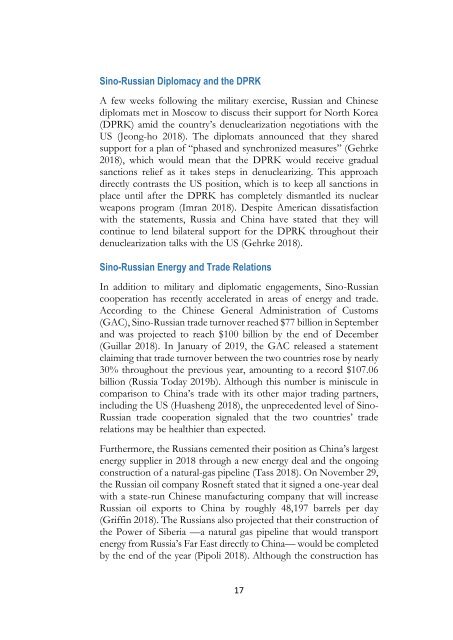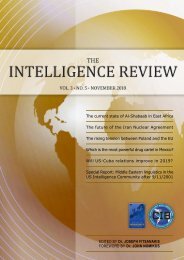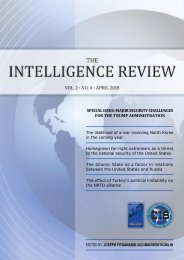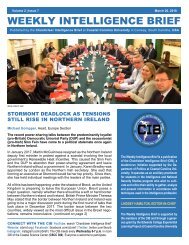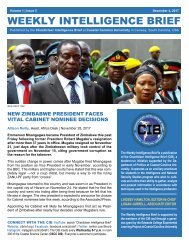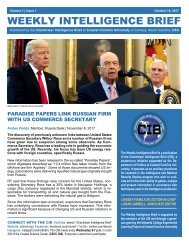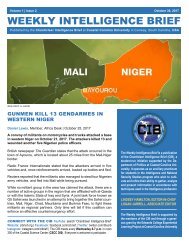The Intelligence Review | volume 3 | issue 6 |
This volume is the product of a collaboration between the European Intelligence Academy (EIA) and the Chanticleer Intelligence Brief (CIB), a pre-professional body supported by the Department of Politics at Coastal Carolina University in Conway, South Carolina, United States. Four CIB analysts tackle some of the most pressing and timely questions confronting intelligence observers today. Topics in this issue include the current and projected state of Sino-Russian relations, as well as recent and projected developments relating to the state of Russia’s Armed Forces. There is also an essay that focuses on the current and projected state of the Sinaloa cartel, one of Mexico’s most prolific organized criminal groups, whose leader, Joaquín Guzmán (also known as el Chapo), is currently serving a life sentence in an American Supermax prison. Last but not least, the present compendium includes an analysis of the leadership prospects of Israel’s embattled Prime Minister, Benjamin Netanyahu.
This volume is the product of a collaboration between the European Intelligence Academy (EIA) and the Chanticleer Intelligence Brief (CIB), a pre-professional body supported by the Department of Politics at Coastal Carolina University in Conway, South Carolina, United States. Four CIB analysts tackle some of the most pressing and timely questions confronting intelligence observers today. Topics in this issue include the current and projected state of Sino-Russian relations, as well as recent and projected developments relating to the state of Russia’s Armed Forces. There is also an essay that focuses on the current and projected state of the Sinaloa cartel, one of Mexico’s most prolific organized criminal groups, whose leader, Joaquín Guzmán (also known as el Chapo), is currently serving a life sentence in an American Supermax prison. Last but not least, the present compendium includes an analysis of the leadership prospects of Israel’s embattled Prime Minister, Benjamin Netanyahu.
You also want an ePaper? Increase the reach of your titles
YUMPU automatically turns print PDFs into web optimized ePapers that Google loves.
Sino-Russian Diplomacy and the DPRK<br />
A few weeks following the military exercise, Russian and Chinese<br />
diplomats met in Moscow to discuss their support for North Korea<br />
(DPRK) amid the country’s denuclearization negotiations with the<br />
US (Jeong-ho 2018). <strong>The</strong> diplomats announced that they shared<br />
support for a plan of “phased and synchronized measures” (Gehrke<br />
2018), which would mean that the DPRK would receive gradual<br />
sanctions relief as it takes steps in denuclearizing. This approach<br />
directly contrasts the US position, which is to keep all sanctions in<br />
place until after the DPRK has completely dismantled its nuclear<br />
weapons program (Imran 2018). Despite American dissatisfaction<br />
with the statements, Russia and China have stated that they will<br />
continue to lend bilateral support for the DPRK throughout their<br />
denuclearization talks with the US (Gehrke 2018).<br />
Sino-Russian Energy and Trade Relations<br />
In addition to military and diplomatic engagements, Sino-Russian<br />
cooperation has recently accelerated in areas of energy and trade.<br />
According to the Chinese General Administration of Customs<br />
(GAC), Sino-Russian trade turnover reached $77 billion in September<br />
and was projected to reach $100 billion by the end of December<br />
(Guillar 2018). In January of 2019, the GAC released a statement<br />
claiming that trade turnover between the two countries rose by nearly<br />
30% throughout the previous year, amounting to a record $107.06<br />
billion (Russia Today 2019b). Although this number is miniscule in<br />
comparison to China’s trade with its other major trading partners,<br />
including the US (Huasheng 2018), the unprecedented level of Sino-<br />
Russian trade cooperation signaled that the two countries’ trade<br />
relations may be healthier than expected.<br />
Furthermore, the Russians cemented their position as China’s largest<br />
energy supplier in 2018 through a new energy deal and the ongoing<br />
construction of a natural-gas pipeline (Tass 2018). On November 29,<br />
the Russian oil company Rosneft stated that it signed a one-year deal<br />
with a state-run Chinese manufacturing company that will increase<br />
Russian oil exports to China by roughly 48,197 barrels per day<br />
(Griffin 2018). <strong>The</strong> Russians also projected that their construction of<br />
the Power of Siberia —a natural gas pipeline that would transport<br />
energy from Russia’s Far East directly to China— would be completed<br />
by the end of the year (Pipoli 2018). Although the construction has<br />
17


